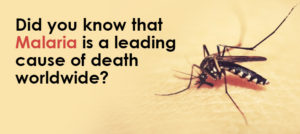Malaria is a mosquito-borne infectious disease affecting humans and other animals.
HOW DOES IT HAPPEN??
It is most commonly transmitted by an infected female Anopheles mosquito.
The mosquito bite introduces the parasites from the mosquito’s saliva into a person’s blood.
The parasites travel to the liver where they mature and reproduce.
APPEARANCE OF SIGN AND SYMPTOMS:
The signs and symptoms of malaria typically begin 8–25 days following infection; however, symptoms may occur later in those who have taken antimalarial medications as prevention.
Initial manifestations of the disease—common to all malaria species—are similar to flu-like symptoms and can resemble other conditions such as sepsis, gastroenteritis, and viral diseases.
The presentation may include
SYMPTOMS:
-Fever with weakness/tiredness
-Vomiting
-Headaches
– Fever with shivering/rigors
-Generalised joint pains
In severe cases:
-Haemolytic anaemia,
-Jaundice,
-Haemoglobin in the urine,
-Retinal damage, and convulsions also.
Symptoms usually begin ten to fifteen days after being bitten.
If not properly treated, people may have recurrences of the disease months later.
The classic symptom of malaria is paroxysm—a cyclical occurrence of sudden coldness followed by shivering and then fever and sweating, occurring every two days (tertian fever) in P. vivax and P. ovale infections, and every three days (quartan fever) for P. malariae. P. falciparum infection can cause recurrent fever every 36–48 hours, or a less pronounced and almost continuous fever.
It is associated with retinal whitening, which may be a useful clinical sign in distinguishing malaria from other causes of fever. Enlarged spleen, enlarged liver or both of these, severe headache, low blood sugar, and haemoglobin in the urine with renal failure may occur. Complications may include spontaneous bleeding, coagulopathy, and shock.
Malaria in pregnant women is an important cause of stillbirths, infant mortality, abortion and low birth weight,particularly in P. falciparum infection, but also with P. vivax.
PREVENTION IS BETTER THAN CURE:
– preventing mosquito bites through the use of mosquito nets and insect repellents
– with mosquito control measures such as spraying insecticides
-draining standing water, not allowing water to get collected in pots, coolers, vessels etc.
– Several medications are available to prevent malaria in travellers to areas where the disease is common.
– Wear light, loose-fitting trousers rather than shorts, and wear shirts with long sleeves. This is particularly important during early evening and at night, when mosquitoes prefer to feed.
You must seek medical help straight away if you become ill while travelling in an area where malaria is found, or after returning from travelling.
Malaria can get worse very quickly, so it’s important that it’s diagnosed and treated as soon as possible.
HOMEOPATHIC HELP:
Few homoeopathic medicines commonly used in such conditions are: cinchona, belladonna, ars alb, merc, phosphoric acid, elaps cor., iodum, ipecac, lycopodium and others.
A homeopathic physician after proper evaluation can suggest the best suited medications as selection of medicines widely depend upon the exact sign and symptoms and constitution of the person, which varies person to person.
Thus one should observe all the measures to prevent the disease and if symptoms appear one should always consult physician and take proper treatment under his guidance.
#experienceehalthwithhomeopathy
#stayhealthy #stayblessed



